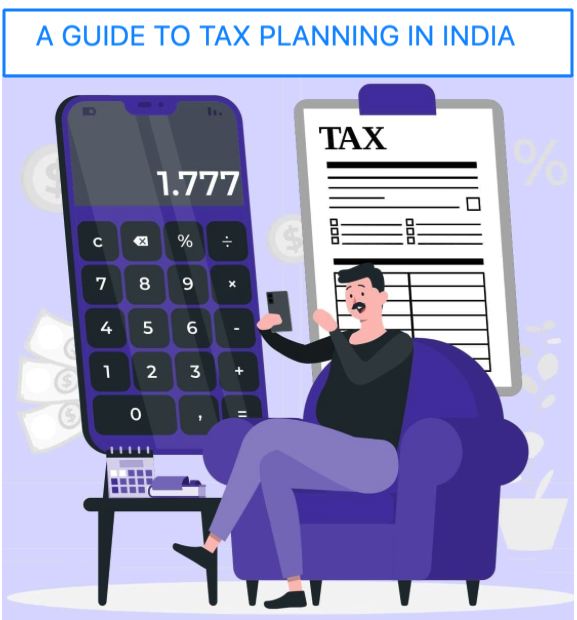Tax planning plays a crucial role in the financial management of both individuals and corporations. In India, where the tax system includes numerous direct and indirect taxes, effective tax planning can lead to substantial savings and financial well-being.
This write up delves into tax planning in India, highlighting its significance, legal guidelines, as well as the strategies and tools available for individuals and businesses to minimize their tax burdens while adhering to the law.

Understanding Tax Planning
Tax planning refers to the evaluation of one’s financial circumstances or plans to ensure that all aspects work in harmony, aiming to minimize tax payments. It involves making strategic investments, expenditures, and financial choices designed to lower tax liability.
Importance of Tax Planning
- Lower Tax Burden: The primary advantage is the legal savings on tax payments.
- Effective Financial Management: It aids in better budgeting, saving, and investment practices.
- Economic Stability: It facilitates the circulation of funds in the economy by investing in government initiatives.
- Compliance: Promotes awareness of tax regulations, reducing the likelihood of penalties.
Legal Framework for Tax Planning in India
Tax planning should always align with legal standards. The Indian Income Tax Act of 1961 provides various sections and deductions that enable tax savings:
- Section 80C: Deductions up to ₹1.5 lakh for investments in instruments like PPF, EPF, ELSS, NSC, and life insurance.
- Section 80D: Deductions for premium payments on medical insurance.
- Section 80G: Contributions to specific charitable organizations qualify for deductions.
- Section 24(b): Up to ₹2 lakh deduction for interest on home loans under “Income from House Property.”
- Section 10: Exemptions for allowances such as HRA, LTA, etc.
- Capital Gains Exemptions: Under sections like 54, 54EC, and 54F for reinvesting gains from property or equity.
It’s important to note that the Income Tax Department closely examines tax returns. Consequently, tax evasion (the illegal act of not paying taxes) must not be confused with tax avoidance (the legal method of reducing tax liability).

Tax Planning for Individuals
- Salaried EmployeesSalaried individuals can take advantage of various allowances and deductions:
- House Rent Allowance (HRA): Applicable if residing in a rented home.
- Leave Travel Allowance (LTA): For travel costs within India.
- Standard Deduction: A flat deduction of ₹50,000 regardless of actual expenses.
- EPF and PPF Contributions: Eligible for deductions under Section 80C.
- NPS Contribution: An extra deduction of ₹50,000 under Section 80CCD(1B).
- Business Owners and Professionals
- Consider presumptive taxation under Sections 44AD/44ADA if you qualify.
- Keep detailed records to support business expense claims.
- Depreciation of assets can substantially lower profits and taxes.
- Invest profits in tax-saving bonds or reinvest in the business for capital gain exemptions.
- Senior Citizens
- Higher exemption thresholds (₹3 lakh for those over 60, ₹5 lakh for those over 80).
- Additional deductions under Section 80D and 80TTB (up to ₹50,000 on interest income).

Tax Planning for Corporates
Corporate tax planning should encompass:
- Business Structure Choices: Different tax implications arise from LLPs, private companies, and partnerships.
- Research & Development and Capital Expenditure Deductions.
- Utilizing Tax Holidays: Available under initiatives like SEZ and Start-up India.
- MAT (Minimum Alternate Tax) Planning: Ensuring accurate credit and the ability to carry forward MAT payments.
- Transfer Pricing Compliance: Necessitated for international dealings.
- Avoiding Double Taxation: Benefits provided by DTAA (Double Taxation Avoidance Agreement).
Investment Instruments for Tax Planning
- Equity-Linked Saving Scheme (ELSS)
- Three-year lock-in period.
- Returns linked to the market.
- Qualifies under Section 80C.
- Public Provident Fund (PPF)
- 15-year term.
- Tax-free interest.
- Government-backed and secure.
- National Pension Scheme (NPS)
- Long-term retirement savings option.
- Deductions under Sections 80C and 80CCD(1B).
- Insurance Policies
- Life insurance and ULIPs offer tax benefits under Section 80C and 10(10D).
- Tax-saving Fixed Deposits
- Five-year lock-in.
- Deduction available under Section 80C.
- Interest earned is taxable
New vs Old Tax Regime
Starting from FY 2020-21, individuals can opt for either the old tax regime (with deductions and exemptions) or the new regime (featuring lower tax rates without deductions).
Income Slab | Old Regime | New Regime |
₹2.5L – ₹5L | 5% | 5% |
₹5L – ₹7.5L | 20% | 10% |
₹7.5L – ₹10L | 20% | 15% |
₹10L – ₹12.5L | 30% | 20% |
₹12.5L – ₹15L | 30% | 25% |
Above ₹15L | 30% | 30% |
Choosing the right tax regime depends on your total earnings and available deductions and exemptions. Careful tax planning is crucial for determining the more beneficial option.
Common Tax Planning Mistakes to Avoid
- Impulsive last-minute planning resulting in poor investment choices.
- Over-committing to tax-saving investments without considering returns or liquidity.
- Overlooking insurance and healthcare coverage, leading to lost deductions.
- Blending tax planning and investment goals without adequate analysis.
Tips for Effective Tax Planning
- Start Early: Initiate your planning at the beginning of the financial year.
- Understand Your Income: Be aware of your income sources and tax brackets.
- Diverse Instruments Approach: Disperse investments across ELSS, PPF, insurance, and more.
- Keep Accurate Records: Save receipts and documents related to all investments and expenditures.
- Reassess Often: Review your plans annually or in response to significant life changes.
- Consult an Expert: Especially important for complex situations or business owners.
Summing up:
Tax planning in India is both a necessity and an opportunity. With a diverse range of deductions, exemptions, and investment options available, individuals and businesses can optimize their financial strategy while complying with tax laws.
As the tax landscape evolves with digitalization and policy changes, being proactive and informed is more crucial than ever. Remember, good tax planning is not about evading taxes—it’s about smart, lawful decisions that maximize your financial well-being
Please feel free to contact us : connect@alphaassure.com
